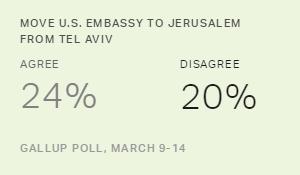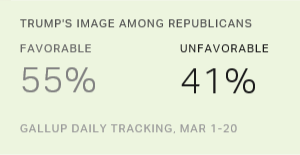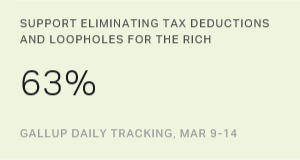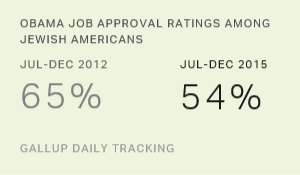Ted Cruz has long made the issue of recognizing Jerusalem as the capital of Israel and moving the U.S. Embassy to Jerusalem the centerpiece of his policies toward Israel, saying he would do so "on day one" of a Cruz administration. Donald Trump, in his speech to the American Israel Public Affairs Committee (AIPAC) on Monday, made the announcement that he would do the same: "We will move the American embassy to the eternal capital of the Jewish people, Jerusalem."
Any contemplated move of the U.S. Embassy to Jerusalem is part of a complex process. The Jerusalem Embassy Act, a bill mandating moving the U.S. Embassy to Jerusalem, was signed into law in 1995. However, each president since then has delayed this action primarily because of the implications it would have for Middle East peace. No countries today have their embassies in Jerusalem.
Jerusalem is a city with immense significance for all sides in the Middle East conflict, and the idea of the U.S. recognizing it as the capital of Israel and ratifying that with a move of the embassy would have great significance in that region. But, the issue is not one that resonates with the majority of the American public. We included the proposal in our measures of the public's reaction to presidential candidate proposals recently, worded as "Recognize Jerusalem as the capital of Israel and move the U.S. Embassy to Jerusalem from Tel Aviv."
The results show that the issue draws a blank with 56% of Americans saying they don't know enough about it to have an opinion. Of those with an opinion, the issue is about evenly split, with 24% of Americans agreeing and 20% disagreeing. Overall, these results show that the issue has generally tepid support.
| Agree% | Disagree% | Don't know enough to have an opinion% | Refused% | Net agree(pct. pts.) | |||||||||||||||||||||||||||||||||||||||||||||||||||||||||||||||||||||||||||||||||||||||||||||||
|---|---|---|---|---|---|---|---|---|---|---|---|---|---|---|---|---|---|---|---|---|---|---|---|---|---|---|---|---|---|---|---|---|---|---|---|---|---|---|---|---|---|---|---|---|---|---|---|---|---|---|---|---|---|---|---|---|---|---|---|---|---|---|---|---|---|---|---|---|---|---|---|---|---|---|---|---|---|---|---|---|---|---|---|---|---|---|---|---|---|---|---|---|---|---|---|---|---|---|---|
| 24 | 20 | 56 | 1 | +4 | |||||||||||||||||||||||||||||||||||||||||||||||||||||||||||||||||||||||||||||||||||||||||||||||
| March 9-14, 2016 | |||||||||||||||||||||||||||||||||||||||||||||||||||||||||||||||||||||||||||||||||||||||||||||||||||
| Gallup Poll | |||||||||||||||||||||||||||||||||||||||||||||||||||||||||||||||||||||||||||||||||||||||||||||||||||
A look at party differences shows that Republicans and leaners are somewhat more likely to favor the embassy move (and Republicans are more likely to have an opinion in general), while Democrats and leaners are less likely to have an opinion and tilt slightly negative. This follows the general breakdown in support for Israel along party lines that we have observed for many years.
We can't look at this proposal within the Jewish segment of the U.S. population because of sample size issues; Jews are about 2% of the national population, and it takes very large samples to be able to isolate them.
But we can aggregate a large sample of interviews conducted since January to take a look at the images of the five remaining presidential candidates among the Jewish population.
The results are in the accompanying table. Given that Jews in America skew Democratic by over a 2-1 ratio (64% identify with or lean toward the Democratic Party in the Jan. 2-March 21 sample, while 29% identify with or lean toward the Republican Party), we would expect the Democratic candidates to have positive images and the Republicans to have negative ones. And they do, with the exception of John Kasich, who is seen more positive than negatively.
| Favorable% | Unfavorable% | No opinion/Don't know% | Net favorable(pct. pts.) | ||||||||||||||||||||||||||||||||||||||||||||||||||||||||||||||||||||||||||||||||||||||||||||||||
|---|---|---|---|---|---|---|---|---|---|---|---|---|---|---|---|---|---|---|---|---|---|---|---|---|---|---|---|---|---|---|---|---|---|---|---|---|---|---|---|---|---|---|---|---|---|---|---|---|---|---|---|---|---|---|---|---|---|---|---|---|---|---|---|---|---|---|---|---|---|---|---|---|---|---|---|---|---|---|---|---|---|---|---|---|---|---|---|---|---|---|---|---|---|---|---|---|---|---|---|
| Bernie Sanders | 61 | 30 | 9 | +31 | |||||||||||||||||||||||||||||||||||||||||||||||||||||||||||||||||||||||||||||||||||||||||||||||
| Hillary Clinton | 60 | 35 | 5 | +25 | |||||||||||||||||||||||||||||||||||||||||||||||||||||||||||||||||||||||||||||||||||||||||||||||
| John Kasich | 45 | 28 | 27 | +17 | |||||||||||||||||||||||||||||||||||||||||||||||||||||||||||||||||||||||||||||||||||||||||||||||
| Donald Trump | 24 | 72 | 4 | -48 | |||||||||||||||||||||||||||||||||||||||||||||||||||||||||||||||||||||||||||||||||||||||||||||||
| Ted Cruz | 20 | 72 | 8 | -52 | |||||||||||||||||||||||||||||||||||||||||||||||||||||||||||||||||||||||||||||||||||||||||||||||
| Jan. 2-March 21, 2016 | |||||||||||||||||||||||||||||||||||||||||||||||||||||||||||||||||||||||||||||||||||||||||||||||||||
| Gallup Poll | |||||||||||||||||||||||||||||||||||||||||||||||||||||||||||||||||||||||||||||||||||||||||||||||||||
But there are some interesting nuances in these data:
- Ted Cruz has been very strong in his support for Israel throughout his career in the Senate and in his presidential campaign, including it as one of the top nine issues detailed on his campaign website. Yet Jews' opinions of Cruz are very negative, and no more positive than are their opinions of his Republican rival Donald Trump. More than seven in 10 Jews have an unfavorable opinion of both men. Cruz, of course, may expect that his strong pro-Israel stance will have a positive impact on the voting behavior of evangelical Christians in the Republican primaries and in the general election.
- These data were collected before Trump's highly visible speech on Israel to AIPAC on Monday, but his image, as noted, was no worse than Cruz's to begin with.
- John Kasich has a much more positive image among Jews than either of his Republican rivals, although he is not well-known.
- Bernie Sanders is the only Jewish candidate at this phase in the election, although he is not a practicing Jew, saying, "I am not actively involved with organized religion." But his Jewish background doesn't seem to make a lot of difference in how he is viewed by Jews, at least in the sense that his image is roughly similar to that of Hillary Clinton. Jewish support for Sanders does net out a little more positive than Clinton's image, mainly because she is a little better known and generates a few more negative responses, but these differences are not major. Jews' opinions of both Democratic candidates are about two-to-one positive over negative.



